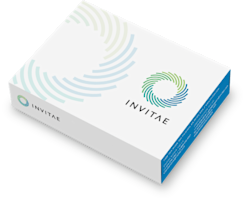
Invitae Elevated C5 Panel
Test code: 06110 •
Test description
The Invitae Elevated C5 Panel analyzes the two genes that are associated with elevations of C5 acylcarnitine on newborn screening (NBS) or plasma acylcarnitine analysis. Genetic testing of these genes may confirm a diagnosis and help guide treatment and management decisions.
Ordering information
Turnaround time:
10–21 calendar days (14 days on average)New York approved:
YesPreferred specimen:
3mL whole blood in a purple-top EDTA tube (K2EDTA or K3EDTA)Alternate specimens:
Saliva, buccal swab, and gDNA are also accepted.Learn more about specimen requirementsRequest a specimen collection kitClinical description and sensitivity
Clinical description:
Elevated C5 acylcarnitines levels that are detected during newborn screening may have genetic and non-genetic causes. Isovaleric acidemia (IVA) and short/branched-chain acyl-CoA dehydrogenase (SBCAD) deficiency can cause elevated C5 on newborn screening or plasma acylcarnitine analysis. Pivalic acid containing antibiotics and sivelestat, as well as some cosmetics, may cause an elevated C5-related artifact on newborn screening.
Patients with IVA can range from severe clinical presentation to asymptomatic. Patients with severe disease may present in the newborn period with lethargy, vomiting, seizures, and metabolic acidosis. If untreated, affected infants can progress to coma and death. Further, these patients may have a “sweaty feet” odor, particularly in times of metabolic crisis. Late-onset intermittent forms have also been described with childhood onset; these patients are typically well and may only have metabolic acidosis during intercurrent illness, prolonged fasting, or increased protein load. In patients with severe disease, treatment by dietary restriction and acute management protocols is possible, though clinical outcome improves when the onset of treatment is prior to the onset of symptoms. Several patients with IVA and at least one copy of p.Ala282Val have also been shown to be very mild or asymptomatic despite elevated C5 and increased urine isovaleric acid and isovalerylglycine. In all cases, early molecular diagnosis may help guide management decisions; in more severely affected patients, it can also improve long-term outcomes.
Patients with SBCAD deficiency that have been diagnosed based on clinical symptoms may present with developmental delay, acute metabolic acidosis, and seizures, but since the advent of expanded newborn screening, diagnosed patients have been largely asymptomatic. Even in the absence of clinical symptoms, patients still show the hallmark elevation of C5 on plasma acylcarnitine analysis and elevation of 2-methylbutyrylglycine in urine.
Assay information
Invitae is a College of American Pathologists (CAP)-accredited and Clinical Laboratory Improvement Amendments (CLIA)-certified clinical diagnostic laboratory performing full-gene sequencing and deletion/duplication analysis using next-generation sequencing technology (NGS).
Our sequence analysis covers clinically important regions of each gene, including coding exons and 10 to 20 base pairs of adjacent intronic sequence on either side of the coding exons in the transcript listed below, depending on the specific gene or test. In addition, the analysis covers select non-coding variants. Any variants that fall outside these regions are not analyzed. Any limitations in the analysis of these genes will be listed on the report. Contact client services with any questions.
Based on validation study results, this assay achieves >99% analytical sensitivity and specificity for single nucleotide variants, insertions and deletions <15bp in length, and exon-level deletions and duplications. Invitae's methods also detect insertions and deletions larger than 15bp but smaller than a full exon but sensitivity for these may be marginally reduced. Invitae’s deletion/duplication analysis determines copy number at a single exon resolution at virtually all targeted exons. However, in rare situations, single-exon copy number events may not be analyzed due to inherent sequence properties or isolated reduction in data quality. Certain types of variants, such as structural rearrangements (e.g. inversions, gene conversion events, translocations, etc.) or variants embedded in sequence with complex architecture (e.g. short tandem repeats or segmental duplications), may not be detected. Additionally, it may not be possible to fully resolve certain details about variants, such as mosaicism, phasing, or mapping ambiguity. Unless explicitly guaranteed, sequence changes in the promoter, non-coding exons, and other non-coding regions are not covered by this assay. Please consult the test definition on our website for details regarding regions or types of variants that are covered or excluded for this test. This report reflects the analysis of an extracted genomic DNA sample. In very rare cases, (circulating hematolymphoid neoplasm, bone marrow transplant, recent blood transfusion) the analyzed DNA may not represent the patient's constitutional genome.
You can customize this test by clicking genes to remove them.
Primary panel
Question about billing?
Find answers